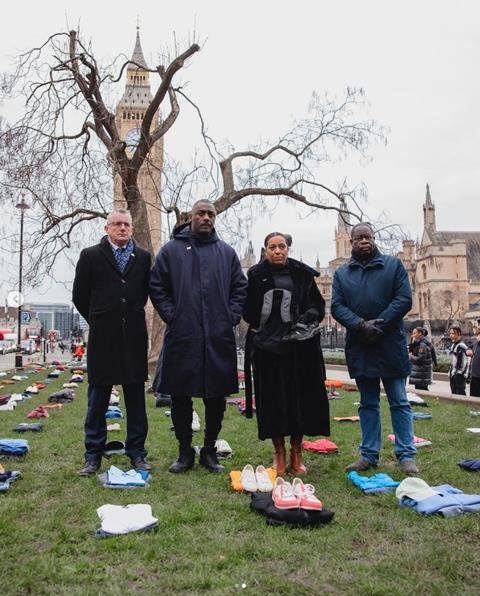As Idris Elba joins the celebrities campaigning for an end to serious youth violence, Karen Saunders says knife crime is not just an urban issue. It’s growing fastest in rural areas and is a problem that the whole Church should care about

Growing up in Abbey Wood, south London, I have witnessed first-hand the lure of gangs and the impact of knife crime. Barely a day goes by without another stabbing hitting the headlines - and not just in urban areas like Abbey Wood; the scourge of knife crime is UK wide, from Bristol to Brighton; Bodmin to Birmingham.
In September, 15-year-old Elianne Andam was stabbed on her way to school in Croydon. Two weeks ago, Darrien Williams, 16, was murdered in Bristol. Last year 42 young lives were lost unnecessarily due to stabbings. Teenagers are twice as likely to be fatally stabbed than they were ten years ago.
High profile celebrities including Idris Elba have used their voices to call for an end to knife crime, resulting in the UK government recently announcing that the sale of zombie knives (ornate knives inspired by zombie films and TV series, commonly with a serrated edge) will be banned from September 2024.
It’s a step in the right direction but, to be honest, I don’t know if it will solve the problem. In the area where I work and live, knives are commonplace, carried by children as young as eight years old. Many are obtained illegally; some simply take a knife from their kitchen because they feel the need to be armed, to be able to defend themselves, and in some cases, simply to be cool.
But carrying a knife isn’t safe and it isn’t a defence mechanism; in fact, you’re 70 per cent more likely to become a victim of your own weapon. This means that if you are the unfortunate victim of an attack, carrying a knife makes you more vulnerable not less.
A different way
In my role as a pioneer evangelist for Church Army, I go into schools and youth centres to offer emotional and practical support to those whose lives are blighted by gangs, drugs and knife crime. I work with around 200-300 young people a week, offering them an alternative choice; a different lifestyle.
Life in Abbey Wood is difficult for them. They see how easy it is to make money from crime and it’s difficult to persuade them that the path Christ offers is superior; that owning expensive watches and cars is little replacement for God’s love. But that’s what I do. That is the challenge I address each day.
The Telegraph recently reported that knife crime is rising primarily in rural areas
My work centres on visiting schools and running youth groups, sharing the power of Christ and demonstrating Christian behaviour. In some cases, I am the only consistent adult in their lives, filling a gap which other agencies, such as social services, don’t have the resources to meet.
It’s sometimes difficult to share my experience in schools because they are multi-faith, but for those without a strong religious tie, I can offer the power of prayer as well as additional support through the groups I run each week. In these groups, we read the Bible together and pray; building resilience and self-esteem through the word of the Lord.
Glimmers of hope
One young man recently told me that he knows he won’t be dealing drugs and carrying a knife for the rest of his life because: “Jesus has a different path for me”. It’s those moments that make my job worthwhile, where I am able to see how living out the gospel makes a difference on a day-to-day basis.
In Eltham, my colleague, Nick Russell, recently saw four young people come to a personal relationship with God and give up carrying knives. His relational youth work, based around love and care for young people, combats their deep mistrust, chronically low self-esteem, fear, anger and aggression, and enables them to have confidence in their own ability to succeed in the world of employment, education and training.
Owning expensive watches and cars is little replacement for God’s love
Our aim is to turn these young people towards faith and away from a life of crime before they even get to that point. It’s hard when young people have family who are already involved in illegal activity, but that just inspires me more. I take the time every week to build relationships, read the Bible and pray with the young people I meet, showing them that there is another way.
In 1 Corinthians 13:13, Paul writes: “So now faith, hope, and love abide, these three; but the greatest of these is love”. It is this love that I carry with me every day; it inspires me to do the work that I do.
Faith gives young people hope, knowing that God is always with them. When the young people in my area turn away from education, it’s easy for them to fall into crime, but with Church Army’s help that doesn’t have to be the outcome. We piloted a project recently to train them in motor mechanics, learning a trade that could lead to employment opportunities and a purpose-filled life, supported by God’s love and the wider Christian community.
A wider problem
It’s easy to see knife crime as an urban problem, but you only have to look at the news to see that it’s everywhere. The Telegraph recently reported that knife crime is rising primarily in rural areas, so while my work is centred in Abbey Wood, there is a need for people like Nick and I all over the UK.
This is probably the biggest issue facing our country today. As Christians, we should look at the area around us – rural or urban – and find the power within us to reach out to young people and offer them our love and hope, and a fruitful path that doesn’t involve crime.
Schools, youth groups and churches all have something to give, something to contribute and something to pray for. The power of God is within us all, and the ability to share that power is the most important gift we have to share.


































No comments yet